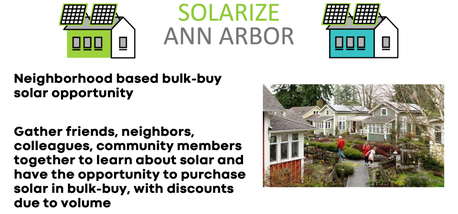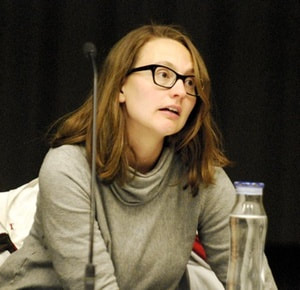OHMHA Board Meeting
November 11, 2020
Guest Speaker: Missy Stults, City of Ann Arbor Sustainability Manager
by Jane Klingsten, OHMHA Board Member

At the November 2020 OHMHA meeting (on Zoom), Dr. Missy Stults, the City’s Sustainability Manager, presented on the City of Ann Arbor’s A2Zero carbon neutrality plan to fight climate change. In November 2019, the City Council declared a climate emergency and established the goal to be a carbon neutral city by 2030. The plan commits the City to entirely eliminate the use of non-renewable energy by the city and its residents within ten years. Designed as a living plan, it was developed collaboratively with input from peer organizations and the invited public. Under way already are large solar farms to meet the City’s municipal electricity demands, a residential group purchase program for solar power systems, electric vehicle chargers downtown, and the recycling plant has been reopened to improve recycling rates. Although funding isn’t yet identified, it’s estimated to cost the City over $1 billion in the next ten years.
The climate action plan’s top strategies aim to power the city solely from electricity cleanly generated from 100% renewable energy. Since DTE produces only 10% of its electricity from renewable sources (25% by 2035), the City plans to build infrastructure to generate a significant amount of clean power by 2020. As DTE has a pricing monopoly on local solar power, Dr. Stults says the City is in a lawsuit and may form a city municipal utility. Other strategies to reduce the city’s carbon emissions footprint are to improve the energy efficiency of buildings; support aging in place; cut motor travel by 40%; improved reuse, recycling, and disposal of materials, and create community resilience hubs to relay opportunities. To achieve a net-zero carbon footprint citywide, the remainder of greenhouse gas emissions may be offset by actions like planting trees or by buying credits for green power produced elsewhere.
In the second half, meeting participants raised questions about the switch to only electric appliances, unaddressed climate change impacts, and alternative energy sources. The switch to electric appliances is currently voluntary, but may become required as the carbon neutrality of the city's electricity improves. Concerns include cost burden, reliability of the electric grid, cooking or hot water in power outages, and higher carbon footprint while with DTE. Unaddressed impacts like the need for pollutant clean-up (lead, dioxane, PFAS), to better protect natural water sources, and reduce thermal waste into the environment, were voiced. Suggestions were made to explore renewable alternatives like wind power, geothermal, hydropower (reopen closed city dams), solar-thermal, and bio-fuels.
Solarize
As part of A2Zero, Solarize is a group purchase program to encourage homeowners to generate and store solar power. During an event, homeowners can join others installing individualized solar power systems from the selected contractor to gain a discount, ranging from 5-15%, depending on the number of event participants. Systems include photovoltaic (PV) solar panels, inverters, mounting rails, and labor, and may optionally include battery banks and back-up generators. In the past year, over 100 homes have installed solar power systems as a result of Solarize. If you would be interested in attending such an event, please contact [email protected] and put your name on our list of interested parties.
Click here for the slides from the November 11, 2020 presentation.
For more information, please contact Ann Arbor Solarize Program Lead Julie Roth, [email protected]
The climate action plan’s top strategies aim to power the city solely from electricity cleanly generated from 100% renewable energy. Since DTE produces only 10% of its electricity from renewable sources (25% by 2035), the City plans to build infrastructure to generate a significant amount of clean power by 2020. As DTE has a pricing monopoly on local solar power, Dr. Stults says the City is in a lawsuit and may form a city municipal utility. Other strategies to reduce the city’s carbon emissions footprint are to improve the energy efficiency of buildings; support aging in place; cut motor travel by 40%; improved reuse, recycling, and disposal of materials, and create community resilience hubs to relay opportunities. To achieve a net-zero carbon footprint citywide, the remainder of greenhouse gas emissions may be offset by actions like planting trees or by buying credits for green power produced elsewhere.
In the second half, meeting participants raised questions about the switch to only electric appliances, unaddressed climate change impacts, and alternative energy sources. The switch to electric appliances is currently voluntary, but may become required as the carbon neutrality of the city's electricity improves. Concerns include cost burden, reliability of the electric grid, cooking or hot water in power outages, and higher carbon footprint while with DTE. Unaddressed impacts like the need for pollutant clean-up (lead, dioxane, PFAS), to better protect natural water sources, and reduce thermal waste into the environment, were voiced. Suggestions were made to explore renewable alternatives like wind power, geothermal, hydropower (reopen closed city dams), solar-thermal, and bio-fuels.
Solarize
As part of A2Zero, Solarize is a group purchase program to encourage homeowners to generate and store solar power. During an event, homeowners can join others installing individualized solar power systems from the selected contractor to gain a discount, ranging from 5-15%, depending on the number of event participants. Systems include photovoltaic (PV) solar panels, inverters, mounting rails, and labor, and may optionally include battery banks and back-up generators. In the past year, over 100 homes have installed solar power systems as a result of Solarize. If you would be interested in attending such an event, please contact [email protected] and put your name on our list of interested parties.
Click here for the slides from the November 11, 2020 presentation.
For more information, please contact Ann Arbor Solarize Program Lead Julie Roth, [email protected]

